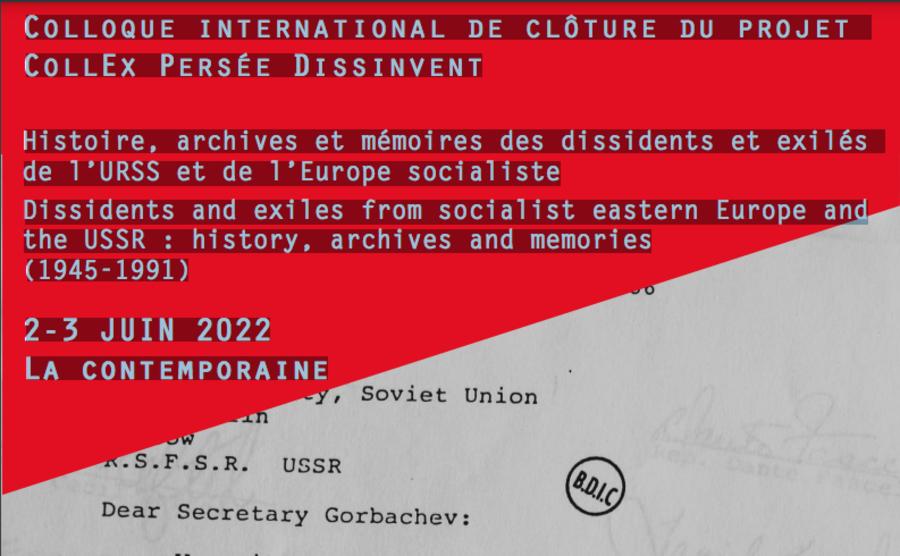Type d'événement, date(s) et adresse(s)
ColloqueUniversité Paris Nanterre
Adresse : 184 Cr Nicole Dreyfus, 92000 Nanterre
Colloque international de clôture du projet CollEx Persée Dissinvent
Histoire, archives et mémoires des dissidents et exilés de l’URSS et de l’Europe socialiste • Dissidents and exiles from socialist eastern Europe and the USSR : history, archives and memories (1945-1991)
| Élément joint | Taille |
|---|---|
| Programme Colloque Dissinvent | 2.42 Mo |

Histoire, archives et mémoires des dissidents et exilés
de l’URSS et de l’Europe socialiste
Dissidents and exiles from socialist eastern Europe and
the USSR : history, archives and memories
(1945-1991)
2-3 JUIN 2022
Terre d’asile pour les « vagues » successives d’émigration de Russie, d’Union soviétique et d’Europe centrale et orientale, la France devient l’un des pays d’accueil de la dissidence venue du « bloc » socialiste européen pendant la longue guerre froide. Si pour certains, la France est une plateforme de passage vers le Royaume-Uni, l’Allemagne, l’Amérique du Nord ou Israël, d’autres s’y installent durablement. Un tissu politique et associatif particulièrement actif fait le lien tant avec les diasporas émigrées qu’avec les institutions françaises et les groupes ou les personnes restées à l’Est. Ces hommes et ces femmes ont produit un important patrimoine documentaire qui reste mal connu, parfois menacé, concernant leur activité éditoriale, de création, de publication et de recherche ainsi que leurs engagements politiques dans ce que l’on peut nommer très largement les « dissidences ». Ils ont aussi été les acteurs de la collecte patrimoniale publique et privée, de son traitement et de sa valorisation, comme collectionneurs, donateurs ou en devenant eux-mêmes des professionnels de la documentation. Ils ont parfois écrit leur propre histoire, et ont été fréquemment sollicités depuis les années 1990 pour des témoignages audiovisuels. Lauréat de l’appel à projet CollEx Persée 2020, le projet DISSINVENT se propose, pour la première fois, d’INVENtorier, rendre visibles nationalement et internationalement et valoriser ces importantes collections produites par les DISSidences « de l’Est » en exil en France, entre 1945 et 1991. Ces fonds méconnus sont à recenser et à mieux décrire dans toute leur diversité, en répondant aux défis transversaux du numérique. Il s’agit dans le même temps de développer une réflexion sur des collections à forte particularité, tant par leur provenance (intellectuels, artistes et savants, militants politiques et syndicaux,associations, maisons d’éditions, ) que par la diversité et la fragilité du corpus documentaire (ego-archives, littérature « grise », ouvrages à petits tirages, publications clandestines type « samizdat », objets témoignant de leur production, tracts, affiches, photographies, films, témoignages oraux) et par leur histoire heurtée, politiquement et émotionnellement.
As a land of refuge for successive waves of immigration from Russia, the Soviet Union and Central and Eastern Europe, France was one of the main receiving countries for dissidents coming from the European socialist bloc during the long Cold War. For many, France was a platform of passage toward the United Kingdom, Germany, North America or Israel, while others settled in the country permanently. By virtue of France’s active political and associational fabric, dissidents and political exiles could connect to their communities in the diaspora, but also with French institutions and with other groups or individuals who remained in the East.These men and women produced a significant documentational heritage that is still today relatively unknown, and which is often under the threat of extinction. To a great extent, this heritage concerns their activities in the domain of publishing, artistic creation, and research, as well as their political commitment in what we can very broadly call the “dissidence(s)”. Very often, dissidents themselves were responsible for the public and private collecting of documentary heritage. As collectors, donors or even sometimes becoming archival professionals, some of them were even in charge of treating and disseminating these collections. Thus, they were sometimes able to fashion their own history, and they were often sought, especially from the 1990s onwards, as witnesses of the historical past for manifold audiovisual productions. Recipient of a grant from the CollEx-Persée in 2020, the project DISSINVENT aims to identify and increase the national and international visibility of the collections produced by Eastern European dissidents exiled in France between 1945 and 1991, also working toward improving their accessibility. These unknown archival fonds have to be identified and better described in their wide diversity, also bearing in mind the transversal challenges posed by the current digital transformation. The aim of the project is to simultaneously develop a reflection on these very singular collections, not only on account of their provenance (having been produced by intellectuals, artists and scholars, political and trade union activists, associations, and publishers), but also considering the diversity and fragility of the documentary corpus (ego-documents, gray literature, books of lesser circulation, clandestine publications of the samizdat type, diverse objects attes-ting to their production, leaflets, posters, pictures, films, oral testimonies) and the politically and emotionally shaken history that lies behind them.
Coordination Sophie Cœuré, professeure à l'Université de Paris (Paris Diderot)
Partenaires : La contemporaine - ICT Université de Paris - Bulac - Bnu - CERCEC - ISP Nanterre - Institut d'Etudes slaves - CREE Inalco - Eur’ORBEM (UMR-8224)